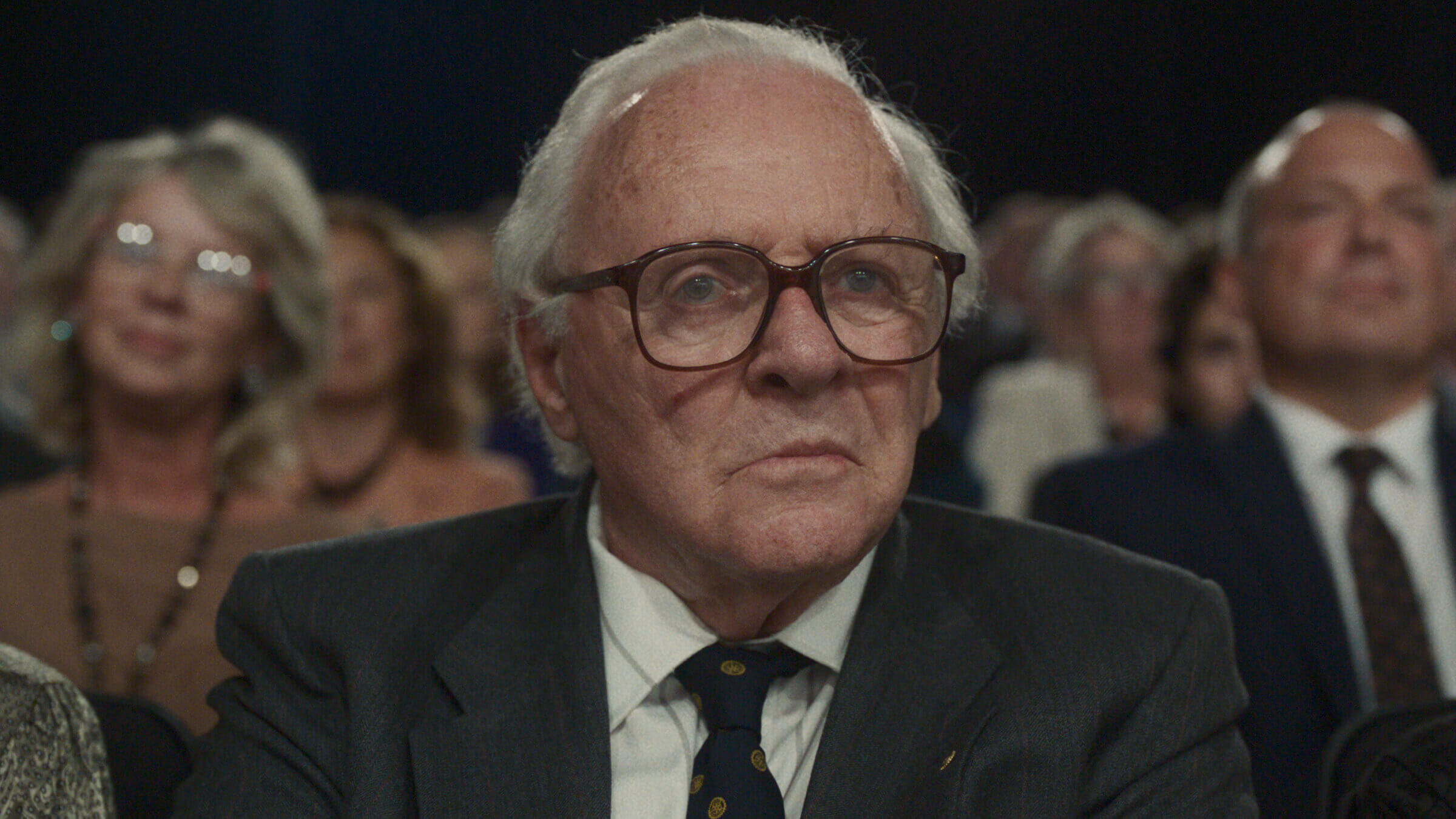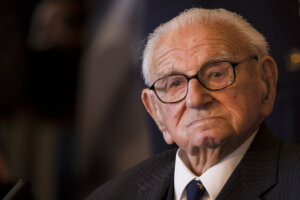A heartbreaking story of Nazi-era heroism — but why did it take so long for it to get here?
In ‘One Life,’ Anthony Hopkins plays Nicholas Winton, sometimes misleadingly called ‘The British Schindler’

Anthony Hopkins stars as Nicholas Winton in One Life. Courtesy of Bleecker Street Media
The tagline of the new film One Life, featuring Anthony Hopkins, is “Save One Life, Save the World.” Based on the book If It’s Not Impossible…, it shows how a small group of unremarkable middle-class Brits managed to rescue refugees from war-threatened Prague in the late 1930s, and even a few Jewish children from the Nazi dictatorship.
Opening the New York Jewish Film Festival 2024 at a time of resurgent antisemitism, with war ongoing in Europe, with a U.K. government that wants to send immigrants to Africa, and as the presumptive presidential nominee for the GOP vows to govern as a dictator, a single life may be the least this BBC co-production can hope for. And yet, split as it is between the 1930s and 1980s, the film barely points to the incipient world of the 2030s.
At the heart of the film is a nostalgia for a self-effacing Britishness that centers “decency, kindness, and a respect for others.” Headliner Hopkins does an excellent job of embodying Nicholas Winton’s “it’s not about me” ethos. Framed by World War II and the Holocaust, good deeds seem simple — the good guys and the bad guys and the victims are all clear. The task for brave, ordinary people is to extract agreements from Czechoslovak and British bureaucracy and fulfill them, rescuing innocents before the evil Nazis bring their war.
In 1938, London stockbroker Winton was one of those brave, ordinary people. In his late 20s he went to Prague to help his friends working with the British Committee for Refugees from Czechoslovakia and ended up as part of a team, alongside Doreen Warriner, Martin Blake, Trevor Chadwick, and others, that brought 669 mostly Jewish children to foster families in the U.K., saving them from almost certain death.

In 1988, after all the committee but Winton had died, their achievements were finally brought to public notice. That’s Life! — a beloved BBC program that was usually satirically concentrated on consumer affairs and current affairs — brought Winton and his scrapbook onto the show to tell his story. In a deeply moving segment, Winton was introduced by Esther Rantzen. Unbeknownst to Winton, he was sitting next to some of the children he had saved 49 years earlier and now wanted to thank him.
In the 35 years since that tear-jerker hit the screen, the clip has been repeatedly broadcast to nations and watched by millions on video hosting sites. The story has been told and retold on television shows and in books and movies.
One Life tells the parallel stories of Winton (born Wertheim, before his German Jewish parents baptized the whole family) as he worked in Prague in the late 1930s and as he was “rediscovered” in the 1980s.
In the earlier story Johnny Flynn (Lovesick, Stardust) plays a naïve, earnest, and determined young man, trying to do some good in the world. While he’s in Prague, Helena Bonham Carter, speaking with a German accent, is his brook-no-refusal mother, supporting “Nicky” on the homefront in London.
In the later story, Hopkins plays the retired stockbroker just trying to clear out his pre-war memorabilia to make room for an arriving grandchild. The film’s evocation of late 1980s England is absolutely spot on, but there is no real sense of why Europe in 1988 was ready to receive Winton so warmly.
After the show, Winton, who lived to the ripe old age of 106, was misleadingly — but fondly — dubbed the “British Schindler” by the British press. He was knighted by Queen Elizabeth II in 2003 and received the highest honor of the Czech Republic, the Order of the White Lion (1st class), from Czech President Miloš Zeman in 2014. The film, though, does not address why, after 30 years of not being interesting enough for such honors, 30 years of approval followed. Nor what the current state of interest in British Jews helping Jewish refugees settle in Britain might be.
This is the first feature that James Hawes has directed, and it’s a disappointment given his precise, suspenseful work in such television shows as Slow Horses, Snowpiercer and Black Mirror. He began his career as a researcher at That’s Life! and harkens back to that prime-time revelation too much.
The only truly moving part of the film is the scene faithfully reproduced from That’s Life! with Samantha Spiro (Sex Education) as Rantzen. There’s a clunky rabbi scene that spells out the dire consequences of misplaced faith in a newly arrived do-gooder and there’s a clunky character device where a father suspicious of Winton finally relents and entrusts him with his three sons (spoiler: they do not all survive). The structure of the film is basically just an expanded version of the That’s Life! segment: Here’s the story, here’s the gap of ignorance, here’s the moving reunion.
The story and its recovery are indeed important and, because it has some wonderful actors (Jonathan Pryce has a cameo as an older Blake) as well as a moving finale, the film works, but it’s a missed opportunity.
Mostly lost in the plot is the irony that it took a naturalized and converted German Jewish family to recognize and realize aspirational British traits. Without them to organize what Winton and Warriner (Romola Garai) call “an army of ordinary people,” the hundreds of foster families would never have mobilized to shelter the refugee children from Prague. And, apparently, completely lost to the screenwriters is any benefit of the historical perspective on 1988 that we might enjoy today.
The film One Life opens the New York Jewish Film Festival 2024 on Jan. 10.






















